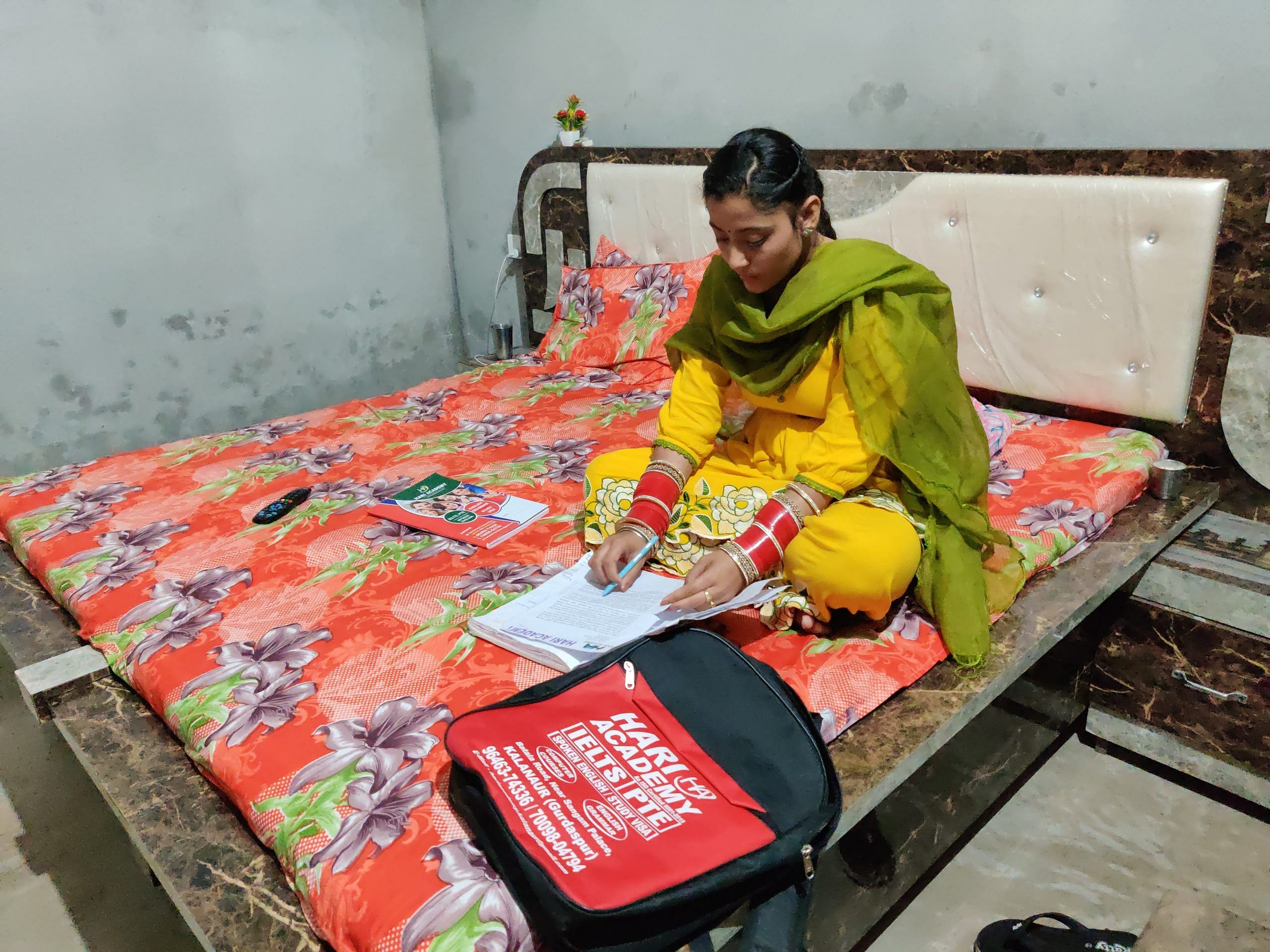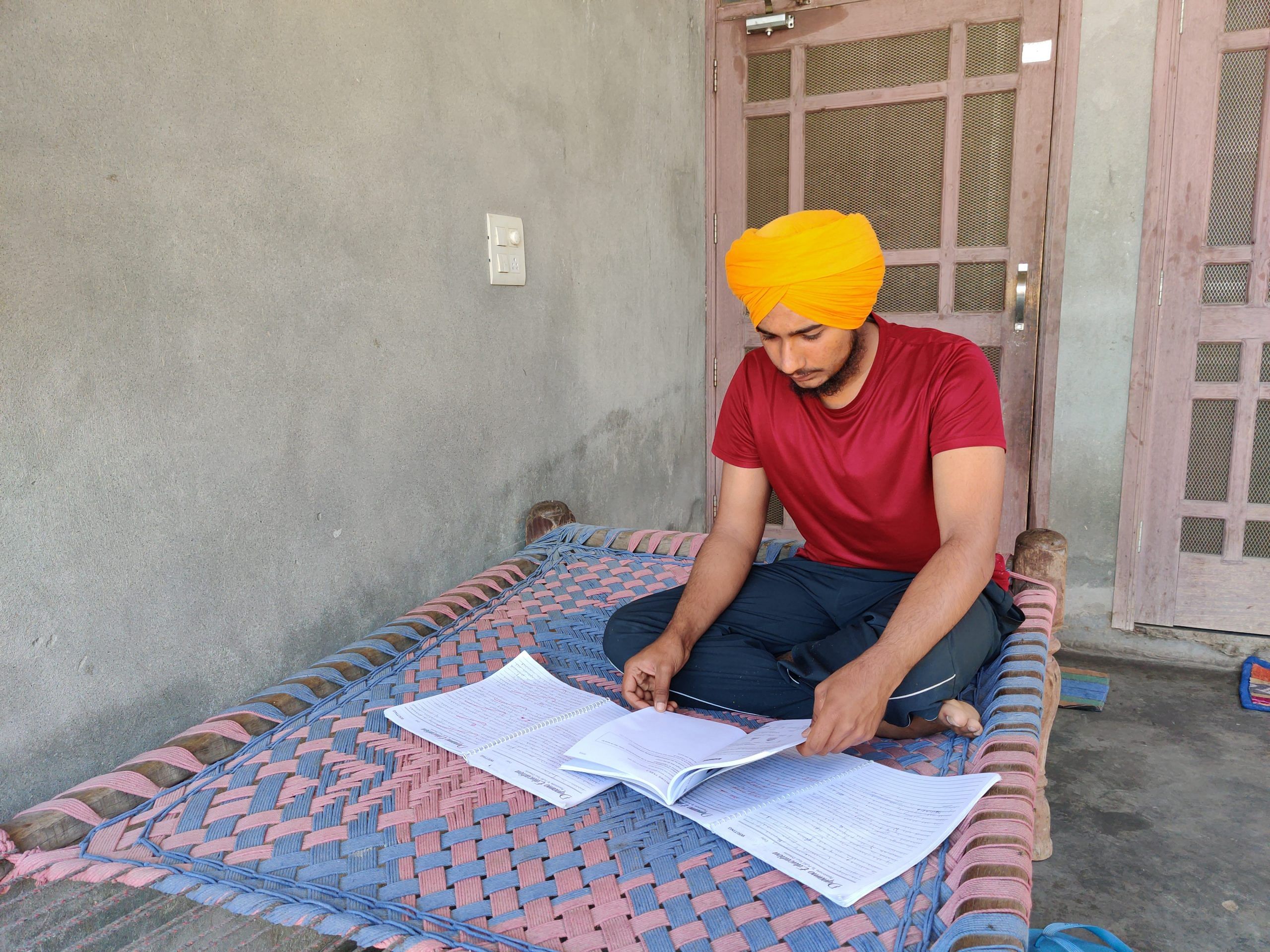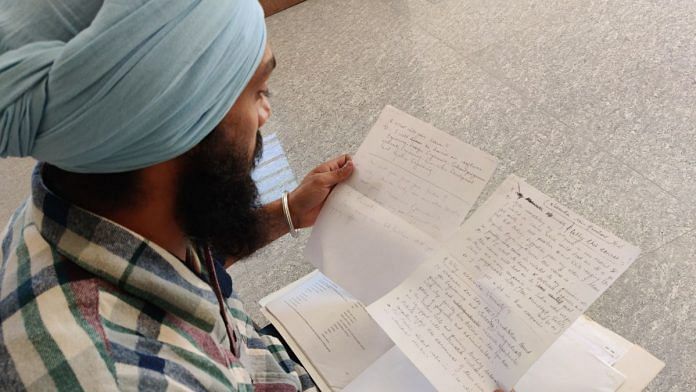Amritsar/Gurdaspur: For five months after completing class 12, Gurbaj Singh memorised the printed questions and answers which could be asked in his US visa interview. His Amritsar-based travel agent, who found the information online, had handed it to him. To ensure that Gurbaj is well-prepared, the agent had even converted a conference room in his office into an interview cabin where Gurbaj sat through six mock interviews before he queued outside the US embassy in Delhi for the final test.
‘Why do you want to go to America? What do you like about America? Why do you want to go to Nebraska University?’, the questions flowed in sequence. He did not pass.
From Chaura village in Punjab’s Dera Baba Nanak, a town on India’s border with Pakistan, Gurbaj is among countless young men and women in villages and cities of Punjab who are dreaming of a life abroad. And to achieve this dream the preparation for migration starts early. It is so compelling that young students don’t even bother to enroll themselves into colleges in Punjab. They spend years trying to crack the visa/slot machine and over time become unemployable in India too.
Education in Punjab inadequate
Gurbaj’s relentless work to migrate abroad started when he was still in school. He took the science stream and scored high enough—above 60 per cent— to meet the first benchmark for admission to colleges abroad.
“Look around, nothing happens in this part of Punjab. No development happens, no good universities or industries come up here because we are so close to the border. If I stay here, what do I study and where do I work?” asks Gurbaj, who graduated from school nine years ago.ThePrint spoke to students in Amritsar, Gurdaspur, Tarn Taran, Ludhiana and Fatehgarh Sahib who said that college education in Punjab is inadequate and that they aim for a high score in school to meet the requirements of the universities abroad.
“The first two or three years will be full of struggle. I will have to manage work and studies and I will get no time free. But life will be so much better after that,” says Parminder Singh, 20, from a village in Amritsar, who has been preparing to go to Australia since he graduated from school in 2021.
Jagpreet Kaur, 22, from Gurdaspur, says that if she has to work hard to do her Bachelors, she might as well do it in Australia. “There is nothing to do in Punjab. Abroad, at least there are opportunities.”
Kaur’s sentiment resonates everywhere in the state. This is evident with the mushrooming of English language coaching institutes in Punjab which prepare students for the International English Language Testing System (IELTS) and Pearson Test of English (PTE). After completing grade 12th, instead of enrolling in a college, students are now marching to these coaching institutes.
A band higher than six in a language ability test is a must for admission to undergraduate courses abroad. For a higher degree, the band requirement also increases, explains Jatinder Sandhu, who runs a travel agency and an IELTS coaching centre in Amritsar.
“It’s easier to get a study visa compared to a work visa. And more and more students are applying for study abroad immediately after completing their 12th because the English language band is lower for undergrad courses. Post that, students will need a higher band,” says Sandhu.
At coaching centres, students attempt weekly mock tests and spend the remaining time glued to YouTube searching for videos of life abroad and what work Indian students can find there.
The country and the courses students choose depend on how much their parents can invest and what options their agents give them. The interest or calibre of the student is, in most cases, not the priority. Almost all the students ThePrint spoke to had a unilateral aim of finding a course abroad only as a means to legitimately enter a country which then allows them to work and stay there permanently.
Hours of practice
Jagpreet Kaur’s day starts early. She packs her register filled with detailed notes and English language books neatly in a brand-new red-and-black bag and spends four hours practising how to speak, read, write and listen to text in a language which she did not learn in school.

From the border district of Gurdaspur, Kaur, 22, is now honing her English language skills to plan a life in Australia.
“I was fed up of trying to find a job in Punjab,” said Kaur, who completed her schooling in 2020 and tried for jobs in the police, Army, border security force and railways since then, but had no luck.
Her three-month stitching course from an Industrial Training Institute could not fetch her a job either. Married six months ago, she has now enrolled in a coaching centre in Gurdaspur town for PTE coaching. Besides learning how to read the English alphabet and form sentences, she learns how to give instructions to the computer during the test’s speaking assessment.
A portion of the test requires one to describe an image verbally. The centre has given her a passage to learn by heart and parrot during this portion — “There is good picture in front of me. Let me have a close look at the picture. By looking closely I can see various colours in the picture – black, blue and white and green. Black is my favourite colour. Some numbers visuals in the picture is like one, two, three, four. I think my timing is getting over. I am moving to the next question. (sic)”
She starts her morning at the coaching institute, and after six hours of studying, she goes back to her marital home and gets started on the day’s chores. Her books come out again after dinner. For this exam, she says, she will have to face a computer, not a human. And that ups her confidence.
“People might have prepared really well, but when they face an examiner, they get nervous and fumble. That can ruin their score. Here, I will only have to face a computer,” she says.
Kaur is also a ticket to a better life for her 31-year-old husband, Satwinder Singh, a farmer, who tried to go to Canada twice on a work visa, but was scammed by agents both times.
“There is no crime in Australia. Here, there is nothing good to eat, to drink. The children will also not have a future here,” she says, her red bridal bangles covering her forearms.
Also Read: Punjab youth are unemployable. The state doesn’t have a Bangalore, Hyderabad, Pune or Noida
Migrating en masse
In the nearby district of Amritsar, Parminder also spends six hours at an IELTS coaching centre. The two-month course costs Rs 6,500. He listens to English spoken by different teachers and three other modules of writing, speaking and reading.
At home though, his mother is anxious about sending him abroad on his own, but Parminder is confident that he will be able to overcome teething issues in no time.
“He doesn’t even pick up his dirty plates. When he will be on his own, he will know the effort that goes into preparing a meal,” says Paramjeet Kaur, his mother.
Almost all of Parminder’s friends are trying to go to abroad; some have already moved to Canada and Australia. The discussions at evening hang-out spots in the village are about difficult modules in IELTS coaching, what kind of work they can look for abroad and which agents have a high visa success rate.

| Sonal Matharu | ThePrint
“There are many people abroad from our village. I will never really be alone. Some of my friends are also trying to go to Australia. We might end up in the same city or in the same college. I will find known people for sure,” he says.
He got into Victoria University in Sydney last year and has been waiting for his visa since. He has deferred his enrollment by a year due to troubles with his visa, he might do it again if it is not resolved before his start date in August.
Agent is the key
Naïve, confused and intimidated by the technical process of visa applications and college admissions, Gurbaj first knocked on the doors of his agent in 2014 and trusted him blindly. When his agent suggested that Gurbaj take admission in the University of Nebraska-Lincoln, he agreed. He wanted a legitimate US study visa stamped on his passport. And he diligently followed the instructions given by his agent.
“I gave the agent’s fee, handed over the set of documents from property and tax papers, bank statements, income proof of my parents, my mark sheets, identity documents and whatever else was required,” he says.
But even after such rigorous preparation, his visa didn’t come through. But he says that the travel agent is not to blame.
“Getting a US visa is not easy. With my visa, my travel agent’s standing in a market, which is saturated with agents, would have also escalated. Candidates would have flocked to him after one US visa. That is why he tried everything he could to ensure that I am well-prepared,” says Gurbaj.
While the students focus on improving their English in coaching institutes, the agents take over the paperwork for visa applications.
“Mostly, the agents suggest the college or course students should apply for. Since agents also handle many cases, they know where admissions are granted easily and where students will be allowed to work along with their studies,” says Sandhu.
And once the visa comes through, then the shopping for winter clothes, utensils and food begins.
Also Read: After Punjab, now Haryana youth fleeing to US–by any ‘donkey’ means possible
Endless hope
For Gurbaj, the wait for a visa has been endless.
His efforts to fulfil a dream are now packed haphazardly in a plastic clip folder — health certificates, slips of income proof and school mark sheets spill out.
“These are the remaining papers. After I didn’t get the visa, I was angry and one day I tore up some of the documents,” says Gurbaj.
After his US visa rejection, his agent convinced him to go to Chile for a six-month hotel management course from a shoddy private institute. He returned frustrated, but not dejected.
Gurbaj is 28 years old now. In the nine years since he finished his schooling, he has given the IELTS multiple times and has spent close to 30 lakh on trying to migrate.
But his dream of a life abroad has not ended yet. His eyes are now set on Canada.
“I will soon enrol in an IELTS institute. I now want to get a course which allows me to stay in Canada. I have to think of my future and start earning also. I have to take care of my family back in Punjab, marry and settle down,” says Gurbaj.
(Edited by Theres Sudeep)



